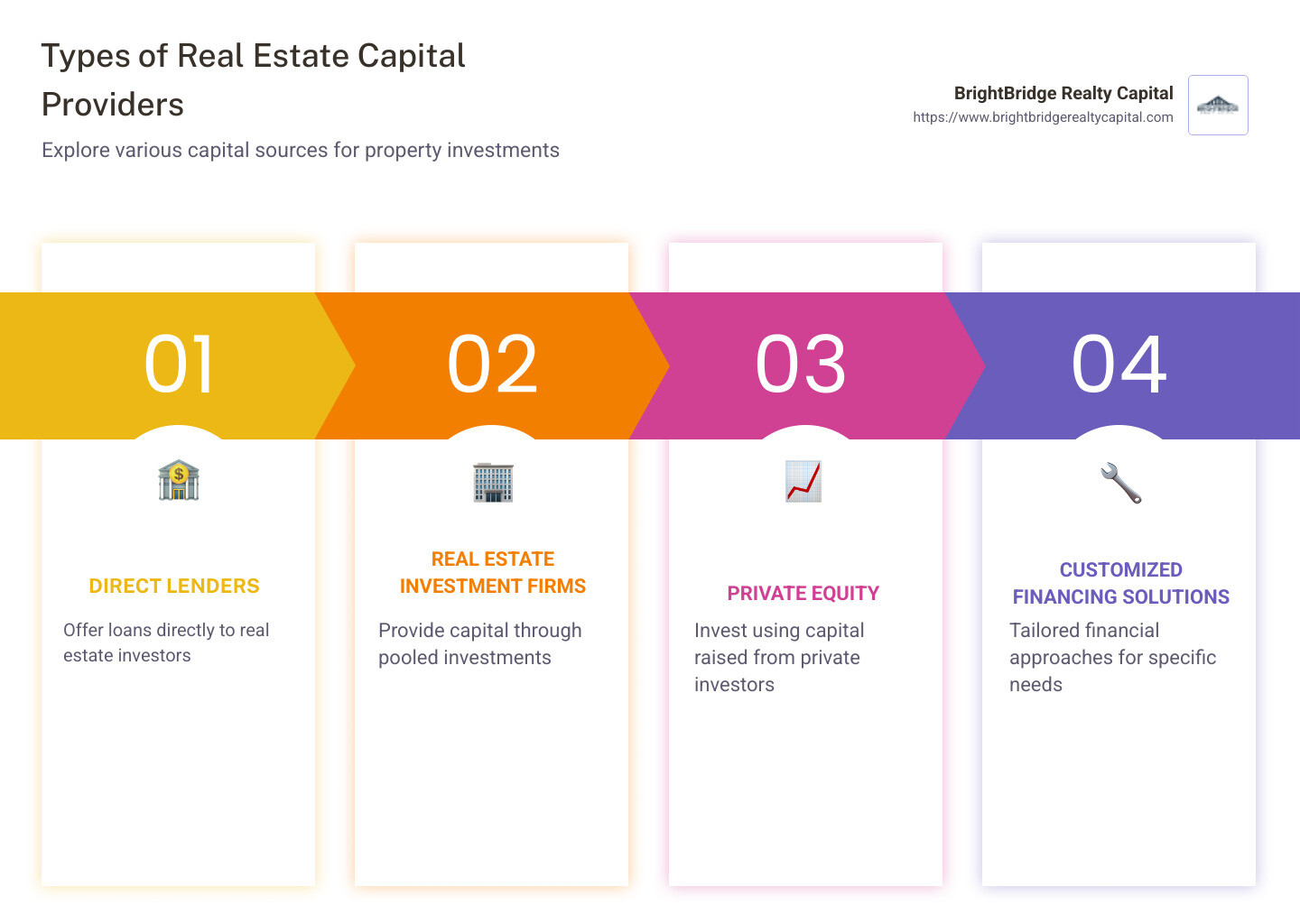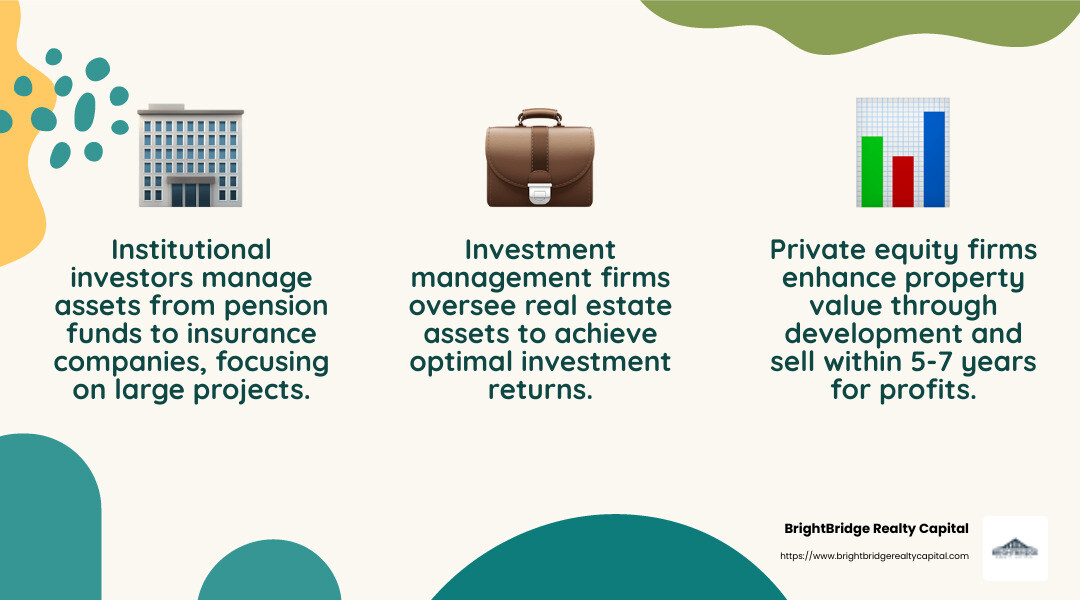Unlocking Capital: A Guide to Real Estate Capital Providers

Real estate capital providers play a crucial role in helping investors steer the complex world of property investments. If you're looking for a quick answer, these providers typically come in several forms:
- Direct Lenders: Offer loans directly to real estate investors.
- Real Estate Investment Firms: Provide capital for real estate ventures through pooled investments.
- Private Equity: Invest in real estate assets using capital raised from private investors.
Understanding the landscape of real estate investing can be overwhelming, especially when it comes to securing capital. Whether you're interested in expanding your rental portfolio or starting on a fix-and-flip project, knowing where to find the right financing solutions is essential.
In this guide, we'll explore the diverse types of capital providers available, revealing pathways for investors seeking to maximize returns efficiently. Real estate capital providers are the linchpin to achieving quick, flexible financing solutions in a competitive market, enabling you to seize investment opportunities without delay.

Understanding Real Estate Capital Providers
When diving into real estate investing, understanding real estate capital providers is crucial. These entities are the backbone of property investment, offering the funds needed to acquire, develop, and manage properties. Let's break down the key players in this field:
Institutional Investors
Institutional investors are large organizations like pension funds, insurance companies, and university endowments. They pool vast sums of money to invest in real estate, seeking stable, long-term returns. Unlike individual investors, they have the resources to take on significant projects, which can include everything from commercial properties to large-scale residential developments.
Private Equity
Private equity firms are another major player in the real estate capital landscape. These firms raise capital from private investors and use it to buy, develop, and sell properties. They often focus on creating value through strategic improvements and then selling the assets for a profit. Private equity firms typically operate through closed-end funds, meaning they aim to return investor capital, plus profits, within a set timeframe, usually 5-7 years.

Investment Management
Real estate investment management firms function similarly to private equity but often use open-end funds. This means they can continuously raise and deploy capital, giving them more flexibility to adapt to market changes. These firms focus on acquiring, managing, and selling properties to generate returns for their investors, leveraging their expertise in market analysis and property management.
In the world of real estate, understanding the roles of these capital providers helps investors align their strategies with the right partners. Each type of provider offers unique advantages, whether it's the stability of institutional investors, the strategic focus of private equity, or the adaptability of investment management firms. By grasping these differences, you can make informed decisions that align with your investment goals and risk tolerance.
Types of Real Estate Capital Providers
When it comes to funding real estate ventures, understanding the different types of real estate capital providers is essential. Let's explore the key players:
Direct Lenders
Direct lenders are financial institutions or private companies that provide loans directly to real estate investors. They cut out the middleman, allowing for potentially faster and more flexible financing solutions. Direct lenders are ideal for those needing quick access to capital, as they often offer customized financing solutions custom to specific project needs. This can be particularly beneficial for unique or time-sensitive projects.
Real Estate Investment Firms
Real estate investment firms, such as Real Estate Private Equity (REPE) and Real Estate Investment Management firms, play a significant role in the capital landscape. They gather funds from investors to acquire, develop, and manage properties. These firms can vary in their approach:
- REPE firms typically operate with closed-end funds, focusing on maximizing returns within a set timeframe.
- Investment Management firms often use open-end funds, providing ongoing investment flexibility and adaptability to market changes.
These firms bring professional management and strategic insight, aiming to improve property value and generate returns for their investors.
Customized Financing Solutions
In the dynamic world of real estate, one size does not fit all. Customized financing solutions are essential for addressing the unique challenges and opportunities each project presents. These solutions might include:
- Bridge Loans: Short-term loans for quick capital access.
- Mezzanine Financing: A hybrid of debt and equity financing, offering flexible capital solutions.
- Joint Ventures: Partnerships between investors and developers to share resources and risks.
Customized solutions allow investors to tailor their financing strategy to align with specific goals and project requirements.
Understanding these types of real estate capital providers helps investors choose the right partners for their projects. Whether seeking the speed of direct lenders, the strategic expertise of investment firms, or the custom approach of customized solutions, aligning with the right provider can be key to successful real estate investment.
How to Choose the Right Real Estate Capital Provider
Choosing the right real estate capital provider is crucial for your investment success. Let's break it down into three key factors: investment goals, risk tolerance, and fund structure.
Investment Goals
Start by clearly defining your investment goals. Are you looking for long-term appreciation, steady income, or a mix of both? Different capital providers cater to different objectives. For instance, Real Estate Investment Management firms often focus on generating stable income through open-end funds. In contrast, Real Estate Private Equity (REPE) firms typically aim for high returns over a set period, aligning with investors seeking capital appreciation.
Risk Tolerance
Understanding your risk tolerance is essential. Some investors are comfortable with high-risk, high-reward opportunities, while others prefer safer, more predictable returns. REPE firms might involve higher risk due to their closed-end fund structure, which focuses on maximizing returns within a specified timeframe. On the other hand, Investment Management firms may offer more conservative options with diversified portfolios to mitigate risk.
Fund Structure
Fund structure plays a significant role in your investment decision. Closed-end funds, common in REPE firms, have a set lifespan, usually 5-7 years, after which they liquidate assets and return capital to investors. This structure can be advantageous for investors seeking a clear exit strategy. In contrast, open-end funds used by Investment Management firms allow for ongoing contributions and redemptions, providing flexibility and continuous investment opportunities.
By considering these factors, you can align your investment strategy with the right real estate capital provider. Whether your focus is on maximizing returns, minimizing risk, or maintaining flexibility, understanding these elements will guide you in making informed decisions.
Key Considerations for Real Estate Capital Providers
When evaluating real estate capital providers, there are three key considerations to keep in mind: investment returns, diversification, and professional management. Let's explore each of these aspects to understand their importance.
Investment Returns
The primary goal for any investor is to achieve strong investment returns. Different capital providers have unique strategies to deliver these returns. For example, some firms focus on acquiring, developing, and selling properties for substantial gains. They often promise high returns but come with higher risks due to their closed-end fund structures.
In contrast, other firms aim to provide stable and consistent returns through open-end funds. These firms focus on managing and optimizing properties for long-term income.
Diversification
Diversification is a critical strategy to mitigate risk. A well-diversified portfolio can help cushion against market volatility. Capital providers often offer diversified investment options across different property types and geographic locations.
For instance, some firms manage a wide range of logistics and real estate assets globally, allowing investors to spread their risk across various markets. This diversification can be particularly beneficial in uncertain economic times, offering a safety net against localized downturns.
Professional Management
Professional management is another vital consideration. Experienced management teams can steer complex market conditions, optimize property performance, and ensure compliance with regulations.
Firms with a wealth of expertise and resources provide investors with confidence that their investments are in capable hands. This professional oversight can lead to better asset performance and, ultimately, higher returns.
By focusing on investment returns, diversification, and professional management, you can make informed decisions when selecting a real estate capital provider. These factors will help you align your investments with your financial goals and risk tolerance, ensuring a well-rounded and successful investment strategy.
Next, we'll address some frequently asked questions about real estate capital providers to help clear up any lingering doubts you may have.
Frequently Asked Questions about Real Estate Capital Providers
What are the benefits of using real estate capital providers?
Using real estate capital providers offers several advantages:
Investment Returns: These providers aim to deliver strong returns by leveraging their expertise and resources. Whether through aggressive acquisition strategies or steady income generation, they have the tools to maximize your potential gains.
Diversification: Capital providers often invest in a wide range of property types and locations. This diversification can help reduce risk and protect your investments from market volatility.
Professional Management: With experienced teams managing your investments, you benefit from their knowledge and ability to steer complex markets, ensuring your assets are well-maintained and optimized for performance.
How do real estate capital providers differ from traditional lenders?
Real estate capital providers and traditional lenders differ in several key ways:
Fund Structure: Capital providers often use closed-end or open-end fund structures, focusing on specific investment goals. Traditional lenders typically provide loans with fixed terms and interest rates.
Investment Strategy: Capital providers actively invest in and manage real estate assets, seeking to improve value and returns. Traditional lenders mainly focus on providing financing without actively managing the properties.
Risk Management: Capital providers employ sophisticated risk management strategies to protect and grow their investments. Traditional lenders primarily manage credit risk associated with loan repayment.
What should investors consider when selecting a capital provider?
When choosing a real estate capital provider, consider these factors:
Track Record: Look for providers with a proven history of successful investments and strong performance.
Fees: Understand the fee structure, as high fees can erode your returns. Compare fees across different providers to ensure you're getting value for your investment.
Alignment of Interests: Ensure the provider's interests align with yours. This might mean they invest their own capital alongside yours, demonstrating confidence in their strategies.
By understanding these aspects, you can select a real estate capital provider that aligns with your financial goals and risk tolerance, ensuring a successful investment journey.
Conclusion
As we wrap up our guide on real estate capital providers, it's clear that choosing the right partner can make all the difference in your investment journey. At BrightBridge Realty Capital, we pride ourselves on offering customized financing solutions that cater to your specific investment needs.
Why Choose BrightBridge Realty Capital?
Customized Financing: We understand that every investor's strategy is unique. That's why we offer custom solutions designed to meet your specific goals, whether you're flipping properties, building from the ground up, or expanding your rental portfolio.
Fast Closings: Time is money in real estate. Our streamlined process ensures you get the funding you need quickly, often within a week. This speed can be crucial in seizing opportunities and staying ahead in a competitive market.
Direct Lending: By cutting out intermediaries, we provide competitive rates and a seamless experience. Our direct lending approach means you deal directly with us, ensuring clear communication and efficient service from start to finish.
Our commitment to providing fast, flexible, and reliable capital makes us a trusted partner in the real estate industry. Whether you're a seasoned investor or just starting, BrightBridge Realty Capital is here to support your investment journey with expertise and efficiency.
For more information on how we can help you open up capital for your real estate ventures, visit our BrightBridge Realty Capital service page. Let's work together to turn your real estate goals into reality.


